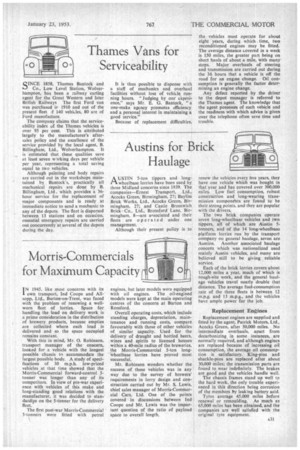Thames Vans for Serviceability
Page 33

If you've noticed an error in this article please click here to report it so we can fix it.
SINCE 1858, Thomas Bantock and Co., Low Level Station, Wolverhampton, has been a railway carting agent for the Great Western and later British Railways The first Ford van was purchased ir 1910 and out of the present fleet 1 140 vehicles, 80 are of Ford manufacture.
The company claims that the serviceability index of the Thames vehicles is over 95 per cent. This is attributed largely to the manufacturer's aftersales policy and the excellence of the service provided by the local agent, B. Billingham, Ltd., Wolverhampton. It is estimated that these qualities save at least seven werking days per vehicle per year, representing a total saving equal to two vehicles.
Although painting and body repairs are carried out in the workshops maintained by Bantock's, practically all mechanical repairs are done by B. Billingham, Ltd.. which provides a 36hour service for the replacement of major components and is ready at immediate notice to send a mechanic to any of the depots. The fleet is dispersed between 13 stations and on occasion, essential emergency repairs are carried out concurrently at several of the depots during the day. It is thus possible to dispense with a staff of mechanics and overhaul facilities without loss of vehicle running hours. "Judging by our experience," says Mr. E. G. Bantock, "a one-make agency promotes efficiency and a personal interest in maintaining a good service."
Because of replacement difficulties,
the vehicles must operate for about eight years, during which time, two reconditioned engines may be fitted. The average distance covered in a week is 150 miles, the greater part being on short hauls of about a mile, with many stops. Major overhauls of steering and transmission are carried out during the 36 hours that a vehicle is off the road for an engine change. Oil consumption is generally the factor determining an engine change.
Any defect reported by the driver to the depot manager is referred to the Thames agent. The knowledge that the agent possesses of each vehicle and the readiness with which advice is given over the telephone often save time and trouble.
























































































































































